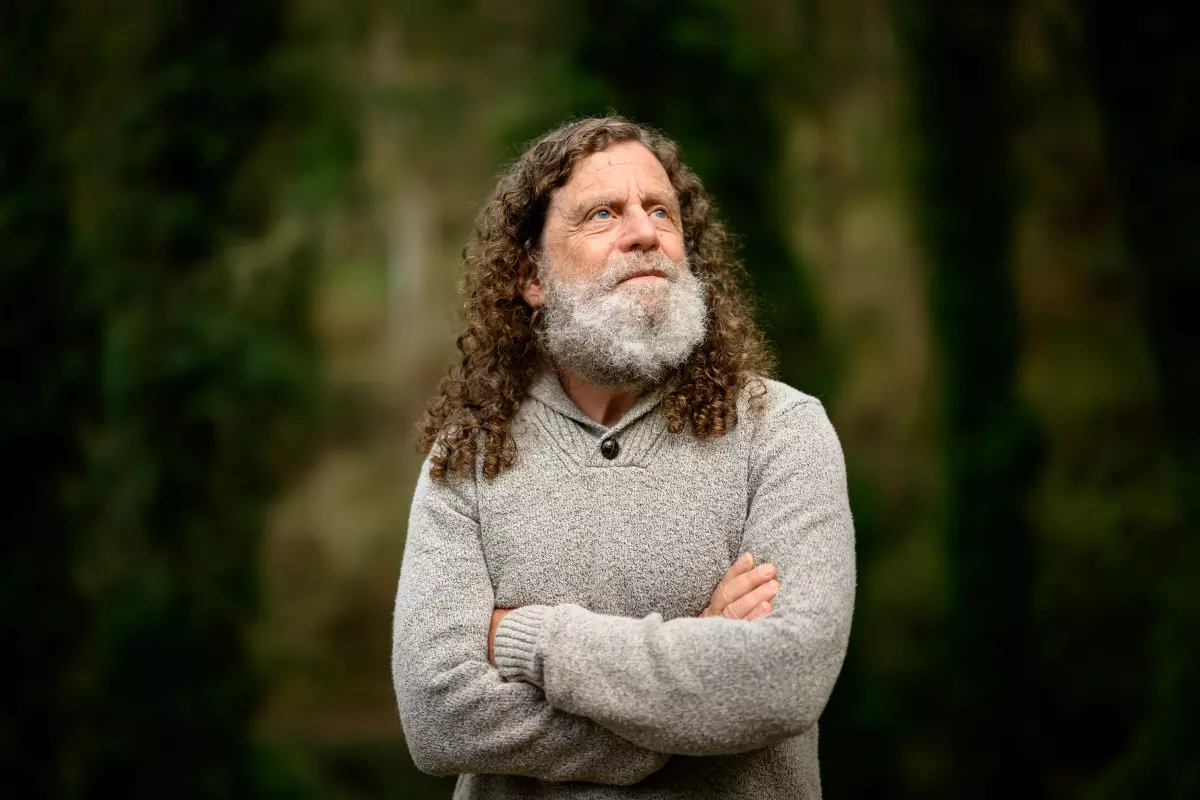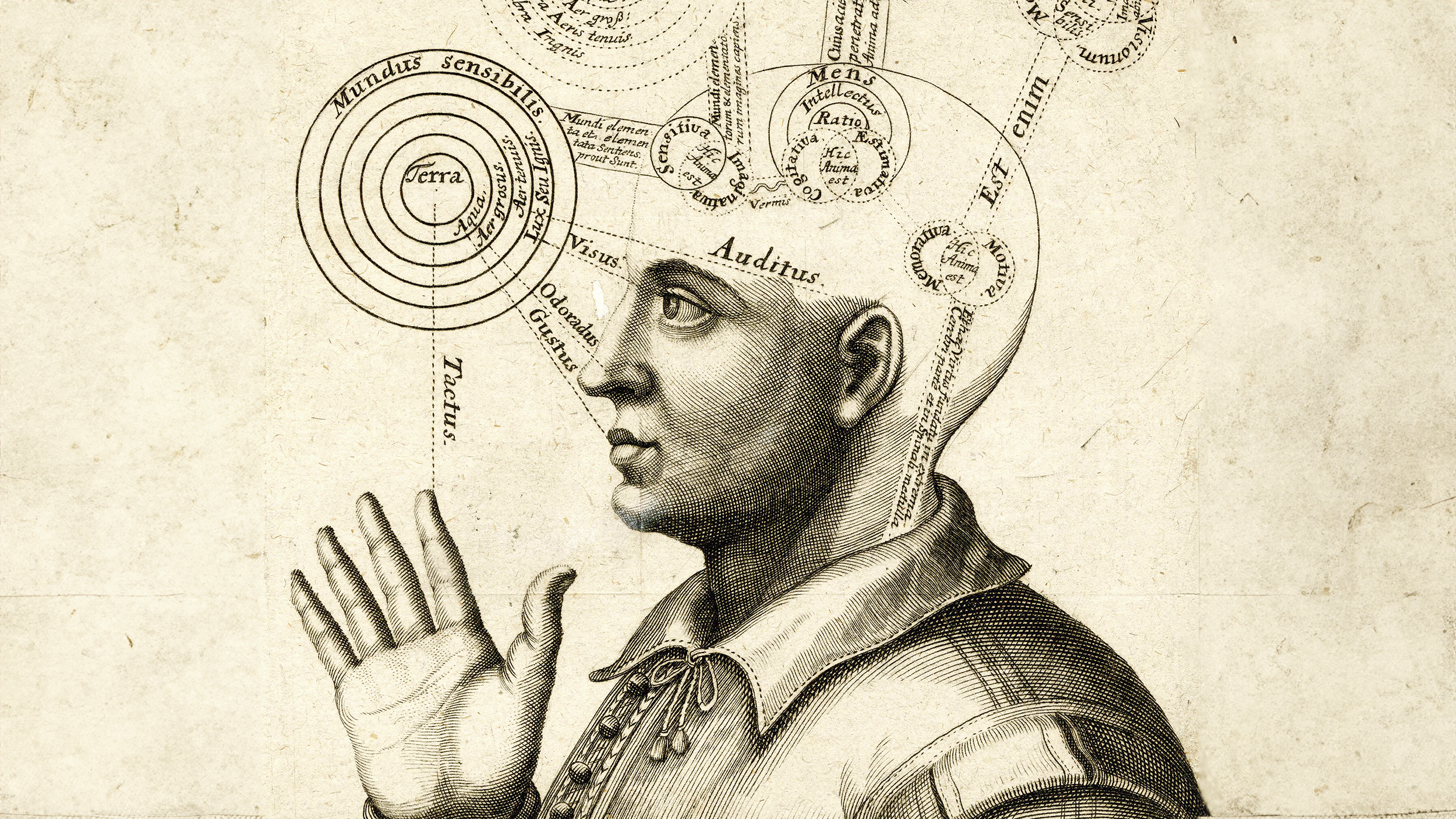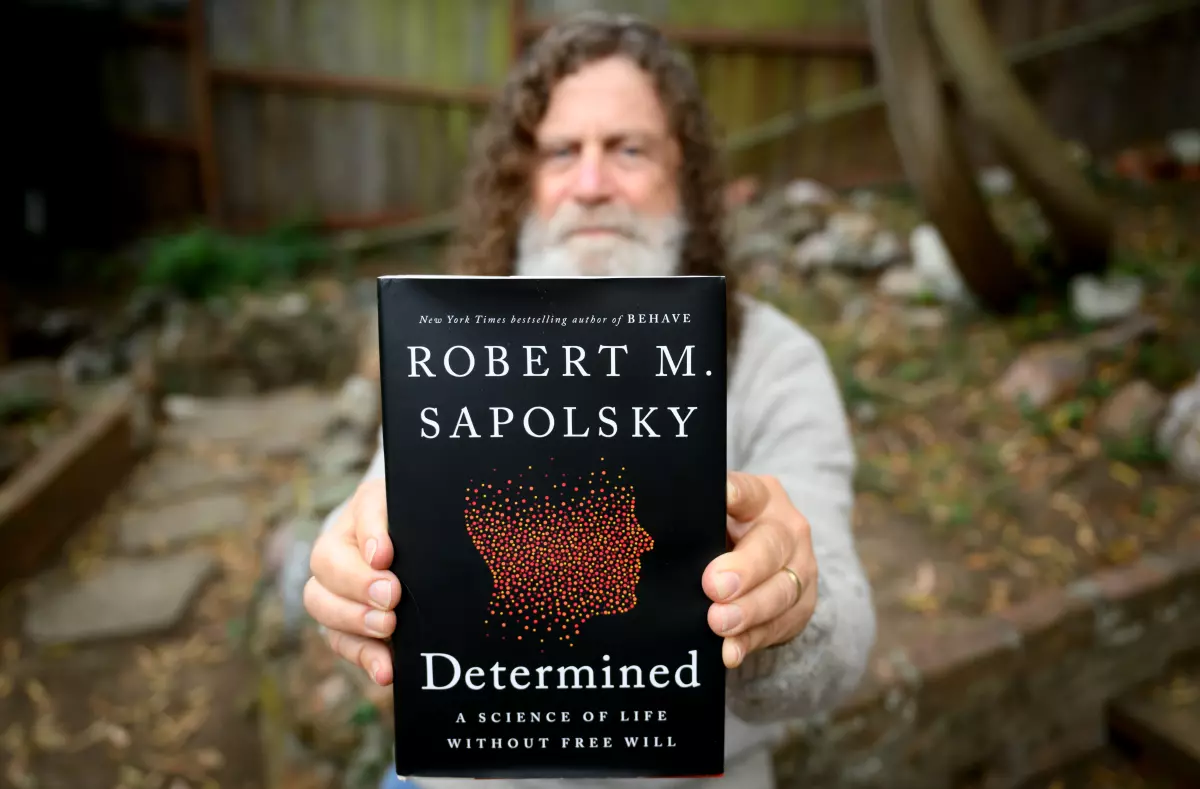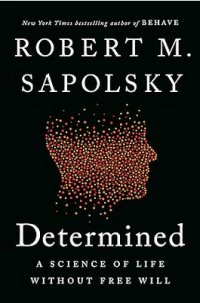Five items about Robert M. Sapolsky and his new book, Determined: A Science of Life without Free Will. Which I haven’t read yet.
Robert M. Sapolsky, who published a big meaty book six years ago called Behave: The Biology of Humans at Our Best and Worst, has a new book just out this week, Determined: A Science of Life without Free Will, about the contentious issue of whether humans (or any other animals) have “free will.” The recent consensus is that we don’t, not in the way we think we do, but it may be OK to *think* that we do, given the consequences — even if we don’t, in the literal sense that we think we do.
This is one of those ideas that fascinates me because it pits human intuitions against the apparent objective reality of the world. Do humans believe in free will because it’s evolutionarily advantageous for us to do so? (Otherwise we would descend into despair, etc.) And how if accepting do we feel we have any agency in our own lives? To what extent does society expect people to be responsible for their actions? This is what I’m looking forward to Sapolsky exploring.

NY Times, Hope Reese, 16 Oct 2023: Robert Sapolsky Doesn’t Believe in Free Will. (But Feel Free to Disagree.), subtitled “Shedding the concept ‘completely strikes at our sense of identity and autonomy,’ the Stanford biologist and neuroscientist argues. It might also be liberating.”
There is no free will, according to Robert Sapolsky, a biologist and neuroscientist at Stanford University and a recipient of the MacArthur Foundation “genius” grant. Dr. Sapolsky worked for decades as a field primatologist before turning to neuroscience, and he has spent his career investigating behavior across the animal kingdom and writing about it in books including “Behave: The Biology of Humans at Our Best and Worst” and “Monkeyluv, and Other Essays on Our Lives as Animals.”
In his latest book, “Determined: A Science of Life Without Free Will,” Dr. Sapolsky confronts and refutes the biological and philosophical arguments for free will. He contends that we are not free agents, but that biology, hormones, childhood and life circumstances coalesce to produce actions that we merely feel were ours to choose.
It’s a provocative claim, he concedes, but he would be content if readers simply began to question the belief, which is embedded in our cultural conversation. Getting rid of free will “completely strikes at our sense of identity and autonomy and where we get meaning from,” Dr. Sapolsky said, and this makes the idea particularly hard to shake.
There are major implications, he notes: Absent free will, no one should be held responsible for their behavior, good or bad. Dr. Sapolsky sees this as “liberating” for most people, for whom “life has been about being blamed and punished and deprived and ignored for things they have no control over.”
The bulk of the piece is an interview. With many pointed questions, and direct responses.
\\\
This piece begins with some good examples about how humans have perceived causes and effects that don’t actually exist.

LA Times, Corinne Purtill, 17 Oct 2023: Stanford scientist, after decades of study, concludes: We don’t have free will
Before epilepsy was understood to be a neurological condition, people believed it was caused by the moon, or by phlegm in the brain. They condemned seizures as evidence of witchcraft or demonic possession, and killed or castrated sufferers to prevent them from passing tainted blood to a new generation.
Today we know epilepsy is a disease. By and large, it’s accepted that a person who causes a fatal traffic accident while in the grip of a seizure should not be charged with murder.
That’s good, says Stanford University neurobiologist Robert Sapolsky. That’s progress. But there’s still a long way to go.
After more than 40 years studying humans and other primates, Sapolsky has reached the conclusion that virtually all human behavior is as far beyond our conscious control as the convulsions of a seizure, the division of cells or the beating of our hearts.
\\\
This one is an excerpt from the new book.

Big Think, Robert M. Sapolsky, 20 Oct 2023: Why the free will debate hinges on intent, subtitled “Neural imaging has shown that the brain has ‘decided’ what we’re going to do before we make a conscious choice — but is this even relevant to free will?”
The evidence from recent decades that something happens in the brain before the brain’s “awareness” “decides” what to do, has recently been disputed, I saw somewhere.
Key Takeaways
• Intent features heavily in issues about moral responsibility — and a huge percentage of research into free will centers on intent. • While it may seem that we are free to do as we intend, we are never free to “intend what we intend,” according to author and neurologist Robert M Sapolsky. • Maintaining belief in free will by failing to ask where intent comes from in the first place is myopic.
The excerpt begins with this illustrative anecdote:
Two men stand by a hangar in a small airfield at night. One is in a police officer’s uniform, the other dressed as a civilian. They talk tensely while, in the background, a small plane is taxiing to the runway. Suddenly, a vehicle pulls up and a man in a military uniform gets out. He and the police officer talk tensely; the military man begins to make a phone call; the civilian shoots him, killing him. A vehicle full of police pulls up abruptly, the police emerging rapidly. The police officer speaks to them as they retrieve the body. They depart as abruptly, with the body but not the shooter. The police officer and the civilian watch the plane take off and then walk off together.
And then asks, what’s going on? What can we infer about these peoples’ actions?
\\\
And finally, a mocking opinion piece about naive consequences of denying free will.

LA Times, Carla Hall, 20 Oct 2023: Commentary: Stop myself from shopping? I can’t! I have no free will
Finally, a scientist who studies human behavior has said the quiet part out loud: The idea that people have free will is a myth.
In his new book, “Determined: A Science of Life Without Free Will,” Stanford University neurobiologist and MacArthur “genius” grant winner Robert Sapolsky contends that almost all human behavior is the result of a complex of neurochemical influences beyond our control.
Of course, we have no free will! Every person on the planet, save otherworldly ascetics, could tell you that.
It’s why we eat the second piece of cake. It’s why we eat the first piece of cake. It’s why my closet is filled with too many expensive handbags (although I do love them all). Years ago, when I saw a photo in a magazine of the actress Blake Lively wearing a fabulous if ridiculously expensive pair of Christian Louboutin shoes, I went to Barneys and bought them. (And it’s why I’m glad Barneys, the ultimate temple of temptation, is now closed.)
And on and on.
If people *believe* they have free will, was that belief set into motion without free will? If you instill that belief in people that they *do* have free will and are responsible for their actions, wouldn’t that improve society? (Some have speculated that the religious idea that “God” is watching you makes people more responsible for their actions, less likely to cheat, and so on.) Or: if everything is predetermined in some sense (some religions believe this), then how and why did the idea of free will come about? Why would a mechanistic computerized utterly predictable universe bring about species who think they have free will? (Because such species would survive, while others would not. Or perhaps because I am not asking these questions correctly. A lot of contentious scientific issues come down to learning what the right question is — another way of saying, overcoming human intuitions and biases.)
I look forward to reading Sapolsky’s book.






